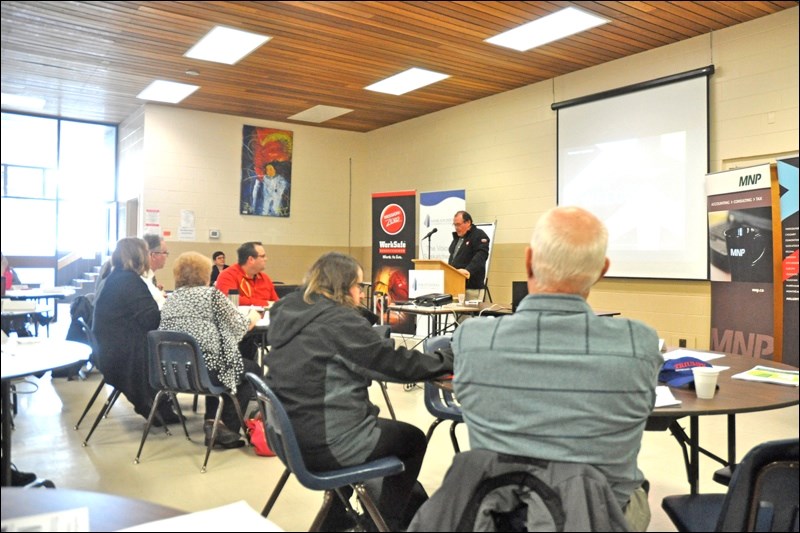Navigating the new world of legalized cannabis in Canada was on the minds of local business people and employers at the Don Ross Centre on Wednesday.
They were there for the day-long seminar called Cannabis 101: Cannabis and the Workplace - Realities, Rights and Responsibilities.
It was designed to provide hard information on what the July 1 legalization of cannabis across Canada will mean for employers and businesses going forward.
This was the fourth such seminar on the topic put on by the Saskatchewan Chamber as well as WorkSafe Saskatchewan, with seminars held in Regina, Saskatoon, and the previous day in Prince Albert. A few more are scheduled for elsewhere in the province.
The seminars have taken on a similar format featuring experts in labour and employment law and in business consulting.
The morning session in North Battleford focused on legal aspects of cannabis with Jon Danyliw, lawyer with Miller Thomson providing that presentation.
It included information on Bill C-45, the Cannabis Act, and on the Saskatchewan Cannabis Framework that was recently released by the province.
Danyliw spent a good deal of time on health and safety issues — an issue of importance to employers who are required by law to ensure their workplaces are safe.
He noted the importance of making sure businesses have up-to-date workplace occupational health and safety policies in place, ones that recognize the changes on cannabis use.
“If you don’t have policies in place, now is as good a time as any to put those in place,” said Danyliw.
He outlined what was needed for those Occupational Health and Safety policies to be effective. The program needed to be in writing, be workplace specific, have commitment from the employer and senior management, have input from the works assign clear responsibilities and accountabilities, have an evaluation mechanism, and be available to employees and effectively communicated.
He noted penalties for failure could range to up to $1,000 in fines from Occupational Health and Safety workplace inspections. Maximum fines for serious injuries or death run at up to $500,000 for individuals and up to $1.5 million for corporations under current legislation.
Another legal issue Danyliw touched on was the Saskatchewan Human Rights Code, and particularly situations where employees have a doctor’s note authorizing their use of medical cannabis.
Employers have a duty to accommodate those employees using medical cannabis, under the human rights legislation.
Danyliw also spoke on the issue of substance abuse. That prompted discussion from those in the room, with concerns expressed about how to deal with employees who are high on the job.
Danyliw also discussed the issue of what to do about employees who come forward with substance dependency issues.
This also falls under the employers’ “duty to accommodate” under the Human Rights Code, but he emphasized every situation had to be dealt with on their facts.
“What might be appropriate for one job might not be appropriate for another job,” said Danyliw.
Danyliw touched on aspects of worker privacy and noted employers were entitled to the “prognosis, not diagnosis.”
He also discussed issues of testing for impairment, drug testing in the workplace, determining impairment in the workplace, and recognizing impairment and how to respond, and employee obligations.
The afternoon session was presented by Janice Decelles, a senior level consultant with MNP LLP.
She and others at the seminar acknowledged many things were still unclear about the coming legalization.
“To be sure, things are a bit hazy”, said Decelles, who emphasized they were providing at the seminar the best information on what they knew right now.
“We’re at the start of our new normal,” she said.
Her session, which focused on human resources policy development, was designed to be hands-on and interactive for participants in the session. She outlined the typical elements you would find in an HR policy, as well as optional elements. Policy “do’s” and how to add cannabis to a HR policy were also outlined.
Decelles also spent time in the afternoon discussing incorporating the “duty to accommodate” into policy.
For participants, the meeting was an eye-opener about their own responsibilities and the consequences they could face if they weren’t ready for legalization.
Chamber president Terry Caldwell believes it was a worthwhile session for those who were there.
“I think it’s really important for employers to get educated on what’s going to be happening in the future,” said Caldwell. He also acknowledged there were still a lot of unknowns about cannabis legalization.
“Some of it is very vague about how it’s going to be delivered to the public in the near future. I think the more you get educated about it the better off you’re going to be as an employer.”
Caldwell also indicated the Chamber may put on at least one more cannabis informational event to further help members be ready for it.




